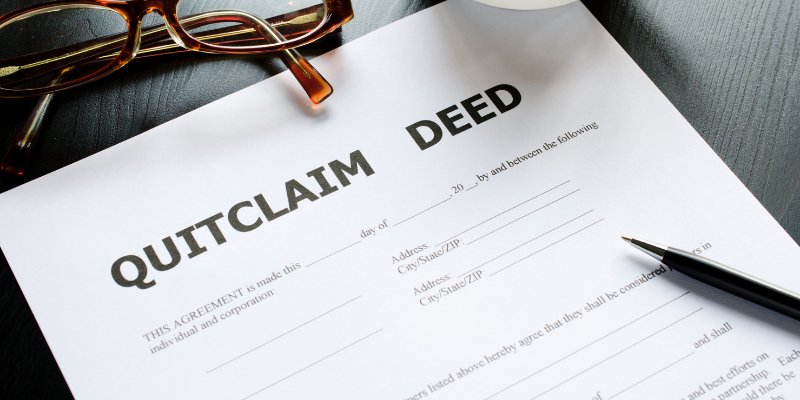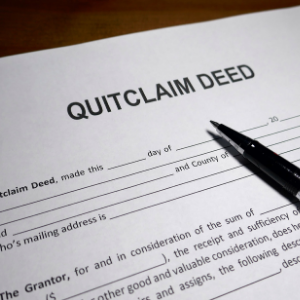
Understanding the Fundamentals of a Quitclaim Deed in New Jersey
A quitclaim deed in New Jersey is a legal instrument that transfers interest or ownership of real estate from one party, known as the grantor, to another, known as the grantee. Unlike other deeds, a quitclaim deed makes no promises or warranties about the title’s validity. It is essential in cases where parties already trust each other, such as moves between family members or divorced couples.
To efficiently execute a quitclaim deed in New Jersey, you must realize that this document merely transfers the grantor’s interest at the time of execution, without assuring that the property is free of liens or encumbrances. The process includes carefully filling out and signing the deed with precise information about the property and both parties involved.
Under New Jersey law, signs must not be notarized to be valid. After execution, the quitclaim deed is recorded with the county clerk’s office where the property is located, completing the transfer and making it part of the public records.
Understanding these foundations helps you navigate real estate deals efficiently under New Jersey’s legal framework.
Distinctions Between Quitclaim and Warranty Deeds in NJ Real Estate Transactions

Understanding the distinctions between quitclaim and warranty deeds is critical for property owners and buyers in New Jersey real estate transactions. A quitclaim deed transmits a grantor’s interest in a property without guaranteeing the title’s validity or encumbrance.
Family members frequently use this deed to clarify ownership following divorce or when there are no potential title flaws. On the other hand, a warranty deed provides more protection by ensuring that the grantor has a clear title to the property and the legal authority to transfer it without any liens or claims.
This assurance includes covenants that cover both present and previous title flaws, making warranty deeds more appealing for traditional house transactions where buyers seek protection against unforeseen concerns. While quitclaim deeds quickly transfer title with little guarantee, warranty deeds give extensive legal protection in New Jersey real estate transactions.
If you’re planning to sell your Newark house fast or buy a home for cash in Jersey City, Better Cash Buyer can make the process smoother. They handle title issues, liens, and closing costs, giving you a stress-free way to move forward.
Legal Requirements to Execute a Quitclaim Deed in New Jersey
In New Jersey, completing a quitclaim deed necessitates following precise legal formalities to ensure the transfer of real estate property is genuine and recognized. To begin, the quitclaim document must clearly identify the grantor, who is giving up their interest in the property, and the grantee, who will gain the interest.
The deed must precisely identify the transferred property to eliminate potential conflicts or misinterpretation. Both partners’ legal names must be included on the document.
The grantor must sign the quitclaim deed before a notary public for the signature to be authenticated and identification verified. Furthermore, New Jersey law requires that a quitclaim deed be filed with the county clerk’s office in the county where the property is located; this assures that public notice and records of ownership changes are kept.
It is also critical for parties concerned to evaluate any applicable transfer taxes or fees levied by local municipalities in New Jersey. Properly executing these stages assures conformity with state legislation governing real estate transfers via quitclaim deeds.
Importance of Title Searches Before Filing a Quitclaim Deed in NJ
Before signing a quitclaim deed in New Jersey, a thorough title investigation is required to ensure a clean transfer of property ownership. A title search identifies any existing liens, encumbrances, or claims against the property that could jeopardize the validity of the quitclaim deed.
In New Jersey, this method aids in the identification of potential concerns such as outstanding mortgages, unpaid taxes, or property-related legal conflicts. When transferring real estate via a quitclaim deed, you risk inheriting these issues if you don’t do a thorough title check.
Ensuring a clear and marketable title is especially crucial because quitclaim deeds do not guarantee the title’s condition; instead, they simply transfer any interest the grantor may have. Doing a thorough title check before filing a quitclaim deed in New Jersey allows all parties to proceed with greater confidence and security in their real estate transactions.
Step-by-Step Guide for Filing a Quitclaim Deed in New Jersey

Executing a quitclaim deed in New Jersey entails numerous critical processes to ensure that the transfer of real estate ownership is legally acceptable. First, obtain a quitclaim deed form that complies with New Jersey legal standards, which can be found online or through an attorney.
Fill out the form, including the grantor and grantee’s full names and addresses, and a thorough description of the transferred property. To avoid future disputes, be sure that all details are precise.
The deed must be signed before a public notary; in New Jersey, notarization is required for the document to be legitimate. Once notarized, submit the completed quitclaim deed to the county clerk’s office where the property is located; this step is required for recording the transfer and making it a public record.
Prepare to pay any necessary recording fees imposed by the county clerk’s office. Furthermore, it is recommended that you check with local authorities to see whether New Jersey’s unique municipal legislation requires any further documentation or disclosures.
Following these rules guarantees that your quitclaim deed process in New Jersey is executed correctly and swiftly, delivering peace of mind to both parties involved.
If you’re looking to avoid the paperwork hassle, Better Cash Buyer can simplify the process when you want to sell your New Jersey house fast or anywhere across the state—helping you close faster without delays.
Costs and Fees for Filing a Quitclaim Deed in New Jersey
When executing a quitclaim deed for real estate in New Jersey, it is critical to understand the charges and fees associated. Filing a quitclaim deed necessitates payment of the recording cost, which varies by county but usually runs between $30 and $50.
Furthermore, small fees for acquiring certified copies of the recorded deed may apply. Depending on the details of the transaction, transfer taxes may also apply. If you choose to have a professional prepare or review the quitclaim deed, keep in mind that there may be legal expenses to verify correctness and conformity with New Jersey law.
Some people employ online businesses or real estate attorneys to help with this procedure, which can increase overall costs but provide peace of mind by ensuring that all legal standards are satisfied when transferring property rights without traditional title guarantees.
The Function of Notarization and Witnesses in New Jersey Quitclaim Deeds
In New Jersey, issuing a quitclaim deed for real land is subject to strict legal formalities, including notarization. When transferring property ownership via a quitclaim deed, the grantor must sign the document before a notary public to confirm its legitimacy and legality.
Notarization is necessary to authenticate the parties’ identities and ensure that the signature on the quitclaim deed is legitimate. While witnesses are not required by New Jersey law when registering a quitclaim deed, having one or more can provide further assurance of validity and help avoid potential authenticity problems.
The notary public’s acknowledgment confirms that the grantor signed the document voluntarily and without coercion. This legal precaution ensures that the transfer of property rights through a quitclaim deed proceeds smoothly and in accordance with New Jersey state rules.
Proper notarization is critical for avoiding delays in recording the deed with county clerks and ensuring that property records accurately reflect ownership changes. Understanding the process of how to remove your name from a mortgage can also help ensure a smoother transition and prevent potential legal or financial complications.
Common Mistakes to Avoid When Filing A Quitclaim Deed In New Jersey
When drafting a quitclaim deed for real estate in New Jersey, it is critical to prevent frequent errors that might cause issues or render the deed unenforceable. One common problem is failing to appropriately identify the grantor and grantee; their names must be spelled correctly and correspond to any existing documentation.
Another common mistake is providing inaccurate property descriptions; check that the legal description matches what is recorded in county records. Many people ignore the need to acquire all requisite signatures, especially if several parties are interested in the property.
Notarization is another crucial step that is sometimes overlooked; without a notarized signature, the quitclaim document may not be legally binding. Furthermore, underestimating tax consequences might cause problems, as transferring property using a quitclaim deed may result in tax reassessment or capital gains taxes.
It is also critical to swiftly record the deed with the county clerk’s office where the property is located, as failure to do so may result in ownership issues or challenges from third parties. Finally, speaking with a real estate attorney before filing will help ensure compliance with New Jersey state regulations and avoid these common mistakes during the quitclaim procedure.
How to Correct Errors on a Filed Quitclaim Deed in New Jersey
To guarantee that property records are accurate, inaccuracies on a quitclaim deed filed in New Jersey must be corrected as soon as possible. First, identify the problem, including misspelled names, inaccurate property descriptions, or erroneous legal information.
Once found, you must draft a corrective deed—also known as a correction deed—specifically stating it is fixing an error in the original quitclaim deed. The corrective deed must contain all exact information. Refer to the original document by recording the date, book, page number, or instrument number.
Notarizing the signatures on the rectified deed is required for legal validity in New Jersey. After notarization, submit the rectified deed to the county clerk’s office where the original quitclaim was recorded.
During this process, keeping track of the filing fees related to deed recording is critical. Consulting with a real estate attorney can help you navigate these stages and avoid future complications with property title transfers and ownership disputes in New Jersey.
The Tax Implications of Transferring Property by Quitclaim Deed in New Jersey

Understanding the tax ramifications is critical when transferring property in New Jersey via a quitclaim deed. Although a quitclaim deed does not directly trigger central state taxes, it is essential to consider the Realty Transfer Fee, which must be paid when the deed is recorded.
This charge depends on the property’s sales price or assessed value. Even if no money changes hands, as is familiar with quitclaim documents used to transfer property between family members, this charge may still apply based on the property’s market value.
The transfer may be subject to federal gift tax if it is considered a gift that exceeds federal restrictions. It is crucial to remember that a quitclaim deed transfers interest without warranties and does not exempt parties from paying future capital gains taxes if they later sell the property for a profit.
Furthermore, receivers should know that transferring ownership through such a transfer may impact their eligibility for certain property tax exemptions or reassessments under New Jersey law. Consulting with a real estate attorney or tax professional can help clarify financial obligations and ensure compliance with all applicable requirements.
How Do I File a Quitclaim Deed in New Jersey?
Filing a quitclaim deed in New Jersey involves a series of straightforward steps to ensure the real estate transfer is valid and enforceable. Begin by obtaining a quitclaim deed form that complies with New Jersey’s statutory requirements. These templates can be downloaded from official real estate sites or purchased at a local stationery provider.
Complete the deed by entering the full names of the grantor and grantee, supplying a complete legal description of the property, and stating the nominal consideration involved, typically a dollar or the terms of the transaction. A notary public must witness the grantor’s signature, whose endorsement confirms the signature’s authenticity.
Once notarized, the deed is filed at the county clerk’s office where the property lies. When you present the deed, be prepared to pay the designated recording fee, which varies by county. Most clerks will also require an Affidavit of Consideration; check with the clerk’s website to confirm which supplemental paperwork is obligatory.
The clerk’s office will record the deed, and the recording stamp will prove that the grantor has relinquished all interest and that the grantee is now the record owner. For future reference and to protect against inadvertent loss, make and maintain at least one photocopy of the filed quitclaim deed. By verifying that all steps adhere to New Jersey statutory and local requirements, the transfer will be complete and defensible against later disputes.
Can I Prepare a Quit Claim Deed Myself?
Yes, you may draft a quitclaim deed in New Jersey, but you’ll need to follow a series of steps to ensure it holds up under state law. A quitclaim deed lets one person transfer title to real estate—sometimes in a family context—without any promise regarding the property’s condition.
First, find the appropriate form. You can download it from the New Jersey Division of Taxation website or pick up a blank version at any stationery store that sells legal forms. Fill it in with the full name and mailing address of both the person giving up the title (grantor) and the person receiving it (grantee). Also, include a complete legal description of the land—this can often be cut and pasted from the property deed you already have.
Don’t skip the notary: the grantor and grantee must sign directly on the quitclaim deed before a notary public. That signature guarantee helps confirm that the same people identified on the form are giving and receiving the title. As a final step, file the original deed at the county clerk’s desk in the county where the property sits; the clerk will stamp it and return a copy to you.
Creating the deed can work, but a brief conversation with a real estate attorney or title company can often address issues and confirm that you have met every New Jersey requirement.
How Much Does a Quitclaim Deed Cost in New Jersey?
When budgeting for a quitclaim deed in New Jersey, multiple elements influence the overall expense. The most significant component is the county recording fee, which is charged each time the deed is filed at the county clerk’s office where the property is situated. Though the precise charge fluctuates by county, a typical range is $30 to $50.
Property owners usually incur charges for notarization in addition to the recording fee. If the deed is complicated or one wishes to double-check state requirements, hiring a real estate attorney is another option; attorney fees for drafting or reviewing the deed generally vary. Retaining legal help is voluntary, yet it can confirm that the statutory requirements are met to consummate the title transfer properly.
Merely filing the deed does not trigger New Jersey’s transfer taxes, which is one reason some choose a quitclaim deed over a warranty deed. Executing the quitclaim deed in exact conformity to statutory standards is advisable to preclude later title disputes or challenges. Costs for professional assistance, while optional, warrant consideration in transactions where the intent is to transfer property graciously or clear a title, making them a prudent budget item.
Should You Hire an Attorney When Using a Quitclaim Deed in New Jersey?
Whether to involve a lawyer when filling out a quitclaim deed is a choice that needs careful thought. New Jersey law does not require an attorney for this kind of deed; however, a brief consultation with a real estate attorney frequently pays off by eliminating uncertainty and risk. An attorney will ensure that the deed is worded correctly, that all statutory language is included, and that the intent of all signers is recorded clearly.
Minor oversights—like missing a middle initial or omitting a power of attorney—can render a deed ineffective even in an otherwise simple document. Ordinarily, the attorney will compare the deed to the property’s original deed and check that all previous instruments are referenced correctly.
The attorney will also order a title search to confirm that no undisclosed mortgages or judgments would survive the quitclaim deed and could create trouble for the new owner. Furthermore, tax, estate, and land-use consequences are more easily spotted when trained eyes review a deed.
Because quitclaim deeds distribute ownership without a sale, the deed may, in some circumstances, result in a significant change in property taxes, trigger due-on-sale clauses in a mortgage, or create unwelcome gifts in the eyes of the IRS. Knowing the implications in advance may allow the parties to adjust the deed or elsewhere in the transaction to contain or avoid the consequences.
Spending thirty minutes with an attorney will usually save hours of explanation, form-filling, and, in the worst case, legal haggles that otherwise follow an improperly recorded quitclaim.
Selling your home in New Jersey is simple with Better Cash Buyer. From fast cash offers to handling all the paperwork, they make the process stress-free. Contact us at (347) 386-2549 today to learn more!
Helpful New Jersey Blog Articles
- How To Execute A Quitclaim Deed For Real Estate In New Jersey
- What to Do If You Inherit a House with a Mortgage in New Jersey
- How to Sell a House With Code Violation in New Jersey
- How to Sell a House with Water Damage in New Jersey
- How to Sell a House Without a Realtor in New Jersey
- How to Sell a Hoarder House in New Jersey
- Selling a House During Divorce in New Jersey
- Selling a House in Probate in New Jersey
- Selling a House with Fire Damage in New Jersey
- Squatters’ Rights in New Jersey
- Can You Sell a House with Tenants in New Jersey?
- Quit Claim Deed in NJ
- Who Pays Taxes When Selling a House in NJ?
- How To Execute A Quitclaim Deed In New Jersey
- Inherited House With Siblings In New Jersey

| PROPERTY DEED | OWNERSHIP INTEREST | REVOCABLE LIVING TRUST | BENEFICIARY | SEAL | FORECLOSURES |
| FORECLOSURE DEFENSE | STATUTES | RISKS | REALTOR | PROBATE | PHOTOCOPIED |
| PHOTOCOPY | MAP | LANGUAGE | INBOX | RIGHT OF SURVIVORSHIP | |
| CHILD | THE GRANTOR HAS | COUNTY CLERKS OFFICE | THE COUNTY CLERKS | THE COUNTY CLERKS OFFICE |
